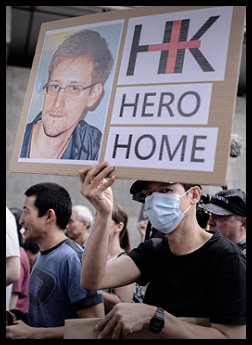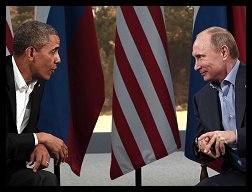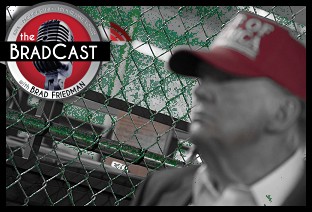 "Some countries are willing to stand up to the United States right now," Michael Ratner told Amy Goodman earlier this week, as he heaped praise upon Ecuador, the nation which previously granted political asylum to Ratner's client, WikiLeaks founder Julian Assange. Ecuador has defied the U.S. by saying it will consider NSA whistleblower Edward Snowden's request for political asylum.
"Some countries are willing to stand up to the United States right now," Michael Ratner told Amy Goodman earlier this week, as he heaped praise upon Ecuador, the nation which previously granted political asylum to Ratner's client, WikiLeaks founder Julian Assange. Ecuador has defied the U.S. by saying it will consider NSA whistleblower Edward Snowden's request for political asylum.
It is likely that Ecuador is already furnishing Snowden with some level of diplomatic protection. AP reports that, according to WikiLeaks, Snowden was being "escorted by diplomats and legal advisers" during his travels from Hong Kong to Russia last weekend. It seems likely that Snowden was met at Moscow's Sheremetyevo International Airport by Ecuadorian diplomats. A black BMW with diplomatic license plates assigned to the Ecuadorian Embassy was reportedly, waiting at the airport last Sunday in advance of Snowden's arrival.
Ecuador is not the only nation that is unwilling to cooperate, for differing reasons, with an apparently vengeful U.S. government which has sought to make an example of Snowden by charging him with espionage. Some, like Hong Kong, have a longstanding commitment to free speech and the right to due process. Others, like Russia, have an interest in closer political and economic ties to the Bolivarian Alliance for the Americas (ALBA) --- a group of socialist and social democratic Latin American and Caribbean nations that includes three potential Snowden destinations, Cuba, Venezuela and Ecuador.
In all cases, there appears to be a growing revulsion towards the overreach of the NSA's increasingly privatized, "Big Brother"-like intrusions and a growing recognition that the United States has long-since abandoned its mantle as a beacon of democracy and a nation devoted to "equal justice under the law"...
Hong Kong and the rule of law
 Although White House Press Secretary Jay Carney complained that the decision to permit Snowden to fly to Moscow will have "a negative impact on the U.S.-China relationship," in truth, there appears to be little, if any, direct evidence that the mainland Chinese government in Beijing played any role in the decision made by the Hong Kong Special Administrative Region (HKSAR) not to interfere with Snowden's departure.
Although White House Press Secretary Jay Carney complained that the decision to permit Snowden to fly to Moscow will have "a negative impact on the U.S.-China relationship," in truth, there appears to be little, if any, direct evidence that the mainland Chinese government in Beijing played any role in the decision made by the Hong Kong Special Administrative Region (HKSAR) not to interfere with Snowden's departure.
What many U.S. politicians ignore, perhaps conveniently, is that a "one country, two systems" arrangement was installed when Chinese sovereignty was restored in the former British Colony on July 1, 1997.
Under the Hong Kong Basic Law, Hong Kong maintains "a high degree of autonomy, except in matters of foreign policy and national defense." Hong Kong exercises its own, independent executive, legislative and judicial powers, including that of final adjudication. The Basic Law guarantees freedom of speech, press, association, movement and religion.
As explained on Democracy Now by Charles Mok, a legislative councilor representing the Information Technology Functional Constituency of Hong Kong, Snowden was entitled to seek political asylum from the HKSAR upon the grounds that he was the object of political persecution. HKSAR courts would likely ensure that Snowden received due process if he advanced such a claim --- a point reiterated by legal experts who predicted that U.S. efforts to extradite Snowden might have dragged on for years.
In it's formal statement, the HKSA announced that it received a "request [that] the HKSAR...issue...a provisional warrant of arrest for Mr. Snowden." The statement added: "Since the documents provided by the US government did not fully comply with the legal requirements under Hong Kong law, the HKSAR..requested the US...provide additional information."
As Snowden's flight to Moscow preceded Hong Kong's receipt of the necessary information, the HKSAR statement continued, "there was no legal basis to restrict Mr. Snowden from leaving Hong Kong."
While the HKSAR justified its inaction on its own domestic laws, there can be little doubt that the NSA's overreach played some role in the decision. In the same formal statement, the HKSAR said it had "formerly written to the US government requesting clarification on earlier reports about the hacking of computer systems in Hong Kong by US government agencies."
Russia and real politik
 While the ultimate outcome of Snowden's peregrinations remains unsettled, there is no indication that the Russians, who have no extradition treaty with the U.S., intend to either arrest or extradite Snowden to the U.S.
While the ultimate outcome of Snowden's peregrinations remains unsettled, there is no indication that the Russians, who have no extradition treaty with the U.S., intend to either arrest or extradite Snowden to the U.S.
To the contrary, Vladimir Lukin, Russia's human rights ombudsman, seized upon the same quirk of international law that forced Iranian refugee Mehran Karimi Nasseri to live in the departure lounge of an international terminal of Charles de Gaulle Airport for nearly 18 years, to assert "that Russia had no authority to expel Snowden," who was not permitted to enter Russia from Moscow's Sheremetyevo International Airport because he did not have a Russian visa. Snowden, according to Ludkin and later confirmed by Russian President Vladimir Putin, remains in a transit facility at the airport and, therefore, is not officially recognized as being on Russian soil.
There was widespread speculation that Snowden might have been arrested after a previously booked flight to Cuba departed Sheretyevo without him. "The Russian news agency ITAR-TASS reported that Snowden's flight to Cuba would have traversed U.S. airspace and been vulnerable to interdiction."
Any doubts about where Russia stood were eliminated earlier this week when Putin declared, "Mr. Snowden is a free person. The sooner he chooses his final destination, the better it is for us and for him."
There are substantive reasons that weighed against Russia intervening on behalf of U.S. authorities which have nothing to do with the somewhat childish assertion made by Sen. Chuck Schumer (D-NY), later repeated by Sen. John McCain (R-AZ), that Putin is simply "eager to stick a finger in the eye of the United States" --- a claim that calls to mind the George W. Bush assertion that "they hate us for our freedom."
There can be no doubt that, for many Russians, Secretary of State John Kerry's appeal to "reciprocity in the enforcement of the law" rings hollow --- especially when measured against the past decade in which a lawless, U.S. unitary executive has engaged in an unprovoked War of Aggression in Iraq and engaged in extraordinary rendition, indefinite detentions, torture and even targeted, extrajudicial killings of U.S. citizens.
The plain and simple truth is that the United States no longer possesses the moral authority to lecture other nations about the rule of law --- not when, as observed by Law Prof. Paul Campos, it operates within "a two-tiered system of laws" where, the vast majority of citizens are subjected to "an unusually harsh criminal code" that has produced, by far, the world's largest prison system, while U.S. "political and financial elites operate with something approaching complete impunity."
President Putin could well look at the fact that the U.S. is so aggressively targeting a whistleblower for revealing what many regard as immense violations of our constitution and our laws, as embodied in the NSA's omnipresent surveillance programs, even while turning a blind eye in the face of a solid case for prosecuting James R. Clapper, the Director of National Intelligence, for perjury.
Who could blame Putin for watching all of that and saying: "Rule of law? You've got to be kidding me."
But decisions of this magnitude, especially in a nation like Russia, are seldom grounded solely upon another nation's hypocrisy or other moral considerations. What is especially significant is that Ecuador and the other two potential destinations for Snowden, Cuba and Venezuela, are all members of ALBA, a group of anti-U.S. imperialist nations of Latin America and the Caribbean, which seek to break free from the domination of what John Perkins aptly described in Confessions of an Economic Hit Man as "the corporatocracy."
As is reflected by the academic work [PDF] of Yuri Paniev, a Latin American expert with the Russian Academy of Sciences, the Russian government sees the desire of the ALBA to slip the leash of U.S. imperialism as an ideal opportunity for Russia to establish economic and political ties in a region of the world that had long been under the corporatocracy's hegemonic control.
Kerry's appeal to reciprocity cannot begin to measure up to these questions of real politik, which may, in the end, ironically find Russia helping to preserve the constitutional rights of Americans, thereby protecting the U.S. Constitution against the threat posed by the same U.S. government officials who had taken a solemn oath to support and defend it.
Sadly, the greatest threat to our constitutional form of representative democracy comes not from foreign terrorists but from the same increasingly privatized, corporate cyber-security state that uses secrecy and the fig leaf of national security to hide its subversive purpose.


 Repub Support for Immigrants Skyrockets Amid Trump's Crackdown: 'BradCast' 7/14/25
Repub Support for Immigrants Skyrockets Amid Trump's Crackdown: 'BradCast' 7/14/25  Sunday 'Totally Predictable' Toons
Sunday 'Totally Predictable' Toons Democracy STILL Our Best Way Out of This Mess -- And Repubs Know It: 'BradCast' 7/10/25
Democracy STILL Our Best Way Out of This Mess -- And Repubs Know It: 'BradCast' 7/10/25 'Green News Report' 7/10/25
'Green News Report' 7/10/25
 'Mass Shooter Subsidy'?: More Dumb, Deadly Stuff in Trump's New Law: 'BradCast' 7/9/25
'Mass Shooter Subsidy'?: More Dumb, Deadly Stuff in Trump's New Law: 'BradCast' 7/9/25  Trump's New Law Supersizes ICE, Mass Detention, Militarization: 'BradCast' 7/8/25
Trump's New Law Supersizes ICE, Mass Detention, Militarization: 'BradCast' 7/8/25  'Green News Report' 7/8/25
'Green News Report' 7/8/25 Texas Flooding Tragedy Was Both Predictable and Predicted: 'BradCast' 7/7/25
Texas Flooding Tragedy Was Both Predictable and Predicted: 'BradCast' 7/7/25 Sunday 'Big Billionaire Bonanza' Toons
Sunday 'Big Billionaire Bonanza' Toons Sunday 'Total Obliteration' Toons
Sunday 'Total Obliteration' Toons 'Green News Report' 6/26/25
'Green News Report' 6/26/25 Thank You For Your Attention to This Matter:
Thank You For Your Attention to This Matter: Mamdani Primary 'Win' Augurs New Era of Rising Progressives: 'BradCast' 6/25/25
Mamdani Primary 'Win' Augurs New Era of Rising Progressives: 'BradCast' 6/25/25 U.S. Authoritarianism Under-way (But We're Still Here to Fight It): 'BradCast' 6/24/25
U.S. Authoritarianism Under-way (But We're Still Here to Fight It): 'BradCast' 6/24/25 'Anti-War' Trump Attacks Iran on False Claims About WMD: 'BradCast' 6/23/25
'Anti-War' Trump Attacks Iran on False Claims About WMD: 'BradCast' 6/23/25 Senate Health Care Cuts 'More Extreme' Than House Version: 'BradCast' 6/19/25
Senate Health Care Cuts 'More Extreme' Than House Version: 'BradCast' 6/19/25 What 'Anti-War President'? MAGA Civil War Over Trump, Iran: 'BradCast' 6/18/25
What 'Anti-War President'? MAGA Civil War Over Trump, Iran: 'BradCast' 6/18/25 Trump's 'Remigration' is Code for 'Ethnic Cleansing': 'BradCast' 6/17/25
Trump's 'Remigration' is Code for 'Ethnic Cleansing': 'BradCast' 6/17/25 Last Weekend Today: 'BradCast' 6/16/25
Last Weekend Today: 'BradCast' 6/16/25
 VA GOP VOTER REG FRAUDSTER OFF HOOK
VA GOP VOTER REG FRAUDSTER OFF HOOK Criminal GOP Voter Registration Fraud Probe Expanding in VA
Criminal GOP Voter Registration Fraud Probe Expanding in VA DOJ PROBE SOUGHT AFTER VA ARREST
DOJ PROBE SOUGHT AFTER VA ARREST Arrest in VA: GOP Voter Reg Scandal Widens
Arrest in VA: GOP Voter Reg Scandal Widens ALL TOGETHER: ROVE, SPROUL, KOCHS, RNC
ALL TOGETHER: ROVE, SPROUL, KOCHS, RNC LATimes: RNC's 'Fired' Sproul Working for Repubs in 'as Many as 30 States'
LATimes: RNC's 'Fired' Sproul Working for Repubs in 'as Many as 30 States' 'Fired' Sproul Group 'Cloned', Still Working for Republicans in At Least 10 States
'Fired' Sproul Group 'Cloned', Still Working for Republicans in At Least 10 States FINALLY: FOX ON GOP REG FRAUD SCANDAL
FINALLY: FOX ON GOP REG FRAUD SCANDAL COLORADO FOLLOWS FLORIDA WITH GOP CRIMINAL INVESTIGATION
COLORADO FOLLOWS FLORIDA WITH GOP CRIMINAL INVESTIGATION CRIMINAL PROBE LAUNCHED INTO GOP VOTER REGISTRATION FRAUD SCANDAL IN FL
CRIMINAL PROBE LAUNCHED INTO GOP VOTER REGISTRATION FRAUD SCANDAL IN FL Brad Breaks PA Photo ID & GOP Registration Fraud Scandal News on Hartmann TV
Brad Breaks PA Photo ID & GOP Registration Fraud Scandal News on Hartmann TV  CAUGHT ON TAPE: COORDINATED NATIONWIDE GOP VOTER REG SCAM
CAUGHT ON TAPE: COORDINATED NATIONWIDE GOP VOTER REG SCAM CRIMINAL ELECTION FRAUD COMPLAINT FILED AGAINST GOP 'FRAUD' FIRM
CRIMINAL ELECTION FRAUD COMPLAINT FILED AGAINST GOP 'FRAUD' FIRM RICK SCOTT GETS ROLLED IN GOP REGISTRATION FRAUD SCANDAL
RICK SCOTT GETS ROLLED IN GOP REGISTRATION FRAUD SCANDAL VIDEO: Brad Breaks GOP Reg Fraud Scandal on Hartmann TV
VIDEO: Brad Breaks GOP Reg Fraud Scandal on Hartmann TV RNC FIRES NATIONAL VOTER REGISTRATION FIRM FOR FRAUD
RNC FIRES NATIONAL VOTER REGISTRATION FIRM FOR FRAUD EXCLUSIVE: Intvw w/ FL Official Who First Discovered GOP Reg Fraud
EXCLUSIVE: Intvw w/ FL Official Who First Discovered GOP Reg Fraud GOP REGISTRATION FRAUD FOUND IN FL
GOP REGISTRATION FRAUD FOUND IN FL

































